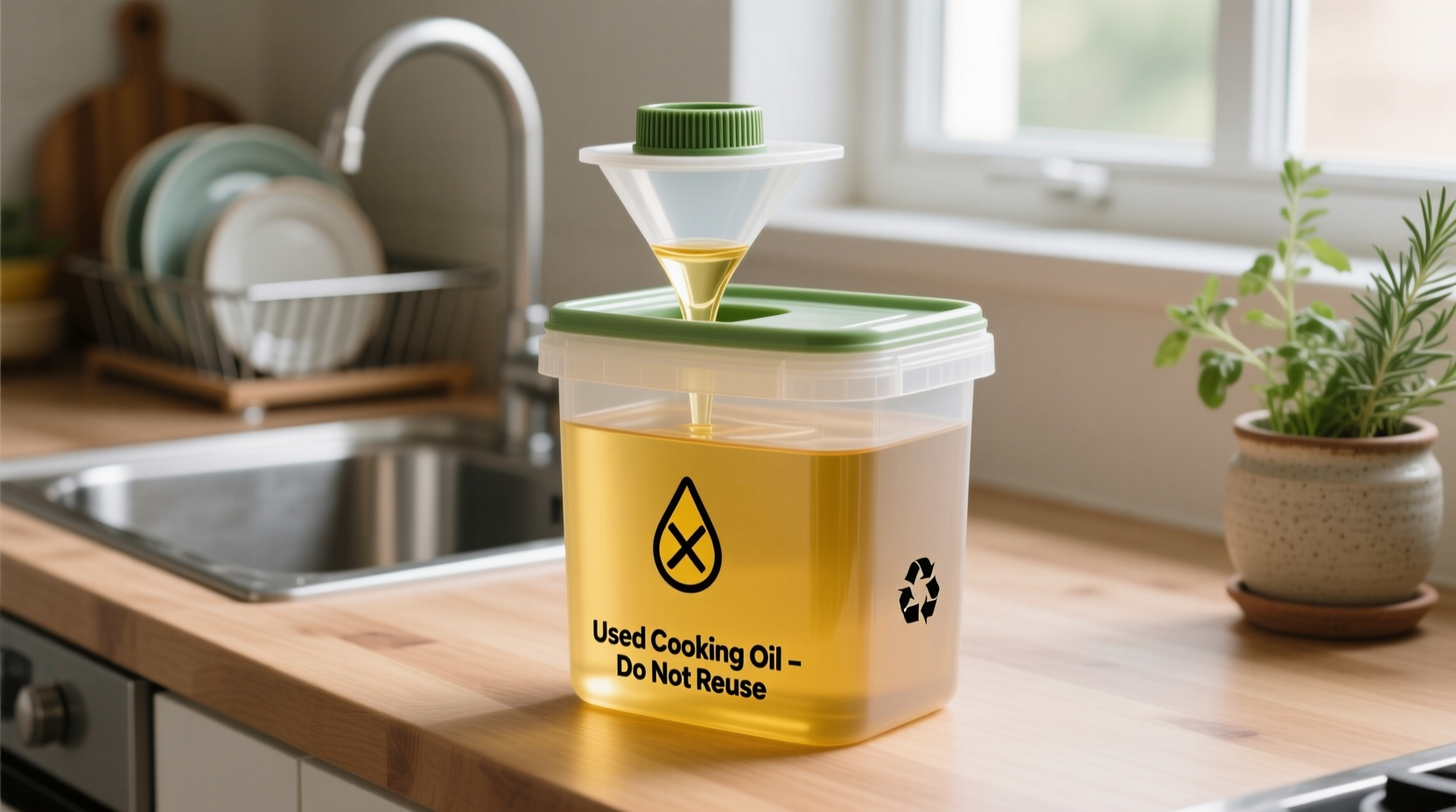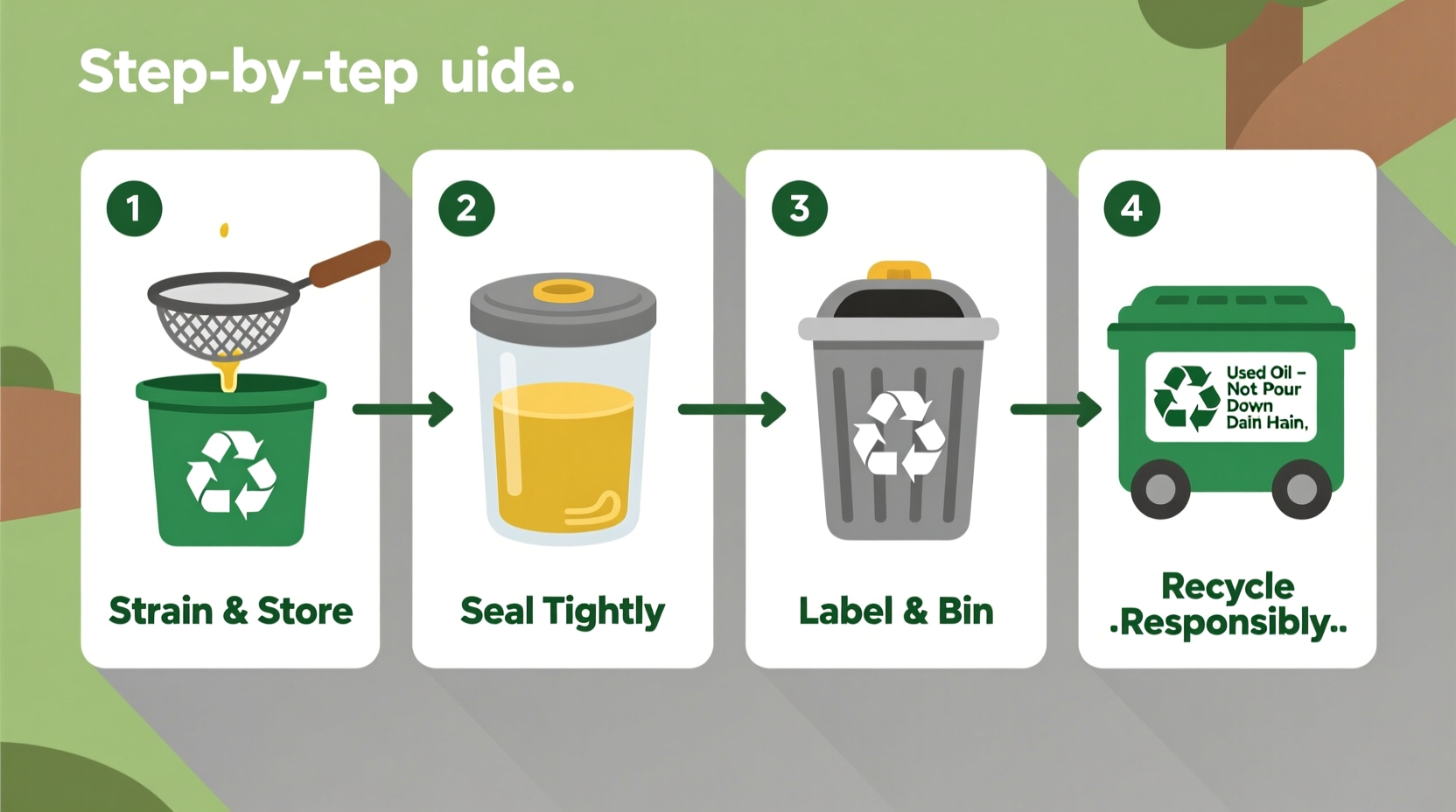The safest way to discard used cooking oil is to let it cool completely, pour it into a sealed, non-breakable container, and dispose of it in your regular trash. Never pour cooking oil down the drain as it causes severe plumbing and sewer system damage. Many communities offer recycling programs for used cooking oil that convert it into biodiesel.
Properly disposing of used cooking oil isn't just about keeping your kitchen clean—it's crucial for protecting your plumbing, local waterways, and the environment. As a professional chef with experience in both high-volume restaurant kitchens and home cooking environments, I've seen firsthand how improper oil disposal creates massive problems. This guide delivers actionable, environmentally responsible methods that work whether you're frying a single chicken breast or catering a large event.
Why Proper Cooking Oil Disposal Matters
When poured down drains, cooking oil solidifies in pipes causing costly blockages. According to the U.S. Environmental Protection Agency, grease-related blockages cost municipalities over $1 billion annually in maintenance and repairs. These blockages lead to sewer overflows that contaminate waterways with harmful bacteria and pollutants.
| Disposal Method | Environmental Impact | Cost to Homeowner | Plumbing Risk |
|---|---|---|---|
| Pouring down drain | Severe water contamination | High (clogs, repairs) | Extreme |
| Regular trash disposal | Low (landfill) | None | None |
| Recycling program | Negative (converts to biodiesel) | None or small fee | None |
Safe Disposal Methods Step-by-Step
Cooling and Container Method (Best for Home Use)
- Allow oil to cool completely—never pour hot oil into containers
- Use a funnel to pour oil into a non-breakable container with a tight lid (metal cans or plastic bottles work well)
- Store the sealed container away from children and pets
- Dispose in regular trash when full
For small amounts (under 1 cup), you can solidify oil by mixing with absorbents like cat litter, coffee grounds, or paper towels before disposal. The U.S. Department of Energy confirms this prevents leaks and makes disposal safer.

Recycling Options (Environmentally Preferred)
Many communities have cooking oil recycling programs that convert used oil into biodiesel. The National Biodiesel Board reports that recycling just one gallon of used cooking oil can produce nearly a gallon of biodiesel fuel. To find programs near you:
- Check with your local waste management authority
- Search Earth911's recycling database for "cooking oil"
- Contact local biodiesel producers directly
- Some restaurants accept small amounts for their recycling programs
Commercial Quantity Disposal
If you regularly dispose of large quantities (common in restaurants), contact licensed waste oil collection services. These companies provide specialized containers and pickup schedules. The Environmental Protection Agency requires commercial kitchens to follow specific grease management practices to prevent sewer system damage.
What NOT to Do With Used Cooking Oil
Avoid these common mistakes that cause serious problems:
- Never pour down drains or toilets—even with hot water, oil solidifies in pipes
- Don't mix with other chemicals—creates hazardous combinations
- Avoid flushing with detergent—only delays the inevitable clog
- Don't put in compost bins—oil disrupts the composting process
Local Regulations You Should Know
Disposal rules vary significantly by location. In some cities like San Francisco and New York, pouring cooking oil down drains violates municipal codes with fines up to $1,000. Many municipalities now offer free drop-off locations for residential cooking oil recycling.
To find your local regulations:
- Visit your city or county waste management website
- Search for "cooking oil disposal" + your city name
- Call your local public works department
- Check with your trash collection service
Environmental Impact of Proper Disposal
When properly recycled, used cooking oil becomes biodiesel that powers vehicles with 78% fewer carbon emissions than petroleum diesel according to the U.S. Department of Energy. Even when disposed in regular trash, containing oil properly prevents it from contaminating soil and water sources.
Practical Tips for Everyday Cooking
- Keep a dedicated disposal container near your cooking area
- Use glass jars with tight lids for small quantities
- Label containers clearly to prevent accidents
- Store containers away from heat sources
- Dispose of containers when ¾ full to prevent spills
Frequently Asked Questions
Can I pour small amounts of cooking oil down the sink with hot water?
No, even small amounts will eventually solidify and cause blockages. Hot water only temporarily liquefies the oil—it solidifies further down the pipe system. The EPA recommends never pouring any amount of cooking oil down drains.
How long can I store used cooking oil before disposal?
Store used cooking oil in a sealed container for no more than 24-48 hours before disposal. Longer storage can cause odors and increase risk of spills. For recycling programs, check their specific time limits as some require same-day drop-off.
Can I reuse cooking oil multiple times?
Yes, but with limitations. Most cooking oils can be reused 2-3 times for frying if properly strained and stored. Discard oil if it becomes dark, foamy, or develops an off smell. Never reuse oil that has been used for frying fish if you'll be cooking other foods.
Is used cooking oil considered hazardous waste?
Used cooking oil is not classified as hazardous waste by the EPA when generated from residential cooking. However, large commercial quantities may have different regulations. Always check with your local waste authority for specific guidelines in your area.
What's the best container for storing used cooking oil?
Metal cans with tight lids (like cleaned coffee cans) work best as they're non-reactive and heat-resistant. For smaller amounts, dark glass bottles prevent light degradation. Avoid thin plastic containers that might leak or react with the oil. Always ensure containers are completely dry before use.











 浙公网安备
33010002000092号
浙公网安备
33010002000092号 浙B2-20120091-4
浙B2-20120091-4